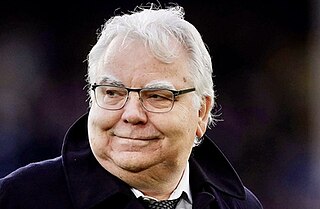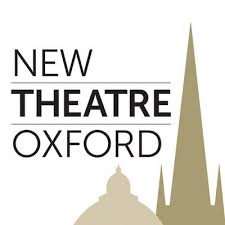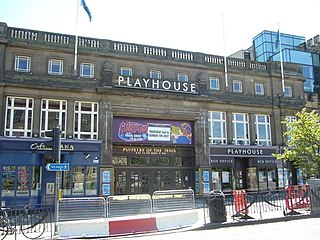Related Research Articles

The Dominion Theatre is a West End theatre and former cinema on Tottenham Court Road, close to St Giles Circus and Centre Point, in the London Borough of Camden. Planned as primarily a musical theatre, it opened in 1929, but the following year became a cinema—it hosted the London premiere of Charlie Chaplin's City Lights with Chaplin in attendance—and in 1933 after liquidation of the controlling company was sold to Gaumont cinema chain, which later became part of the Rank Organisation. It was a major premiere cinema until the 1970s, when it began to host live concerts.

Tower Park is a leisure and retail park, located at Mannings Heath, in Poole, Dorset, England. It was one of the first complexes of its kind in Europe when it opened in 1989.

William Kenwright, CBE was an English theatre and film producer. He was also the chairman of Everton Football Club for nearly two decades, from 2004 until his death in 2023.

Dune FM was an Independent Local Radio station serving Southport, Sefton and surrounding areas between 1997 and 2012.

The Rank Group plc is a gambling company based in the United Kingdom. Rank was involved in the cinema and motion picture industry until 2006, and continues to use the Gongman logo originally used by the Rank Organisation's film distribution subsidiary General Film Distributors. Its brands now include Mecca Bingo, and Grosvenor Casinos, the UK's largest casino operator.

Ardwick is a district of Manchester, England, one mile south-east of the city centre. The population at the 2011 census was 19,250.

The Alexandra, commonly known as the Alex, is a theatre on Suffolk Queensway in Birmingham, England.
Live Nation is an American events promoter and venue operator based in Beverly Hills, California. Founded in 1996 by Robert F. X. Sillerman as SFX Entertainment, the company's business was built around consolidating concert promoters into a national entity to counter the oversized influence of ticket behemoth Ticketmaster. In 2000, the company was sold to Clear Channel Communications for $4.4 billion and operated as Clear Channel Entertainment until 2005, when it was spun off as Live Nation. In 2010, Live Nation merged with the ticketing firm Ticketmaster to form a larger conglomerate named Live Nation Entertainment.
Live Nation UK is the United Kingdom subsidiary of Live Nation Entertainment. They are best known for promoting concerts, operating venues and running festivals.

New Theatre Oxford is the main commercial theatre in Oxford, England. It has a capacity of 1,785 people; is on George Street, in the centre of the city; and puts on a wide variety of shows, including musical theatre, stand-up comedy, and concerts.
Apollo Cinemas was a locally focused, independently owned multiplex cinema operator in the United Kingdom. It showed mainstream blockbusters, independent film and onscreen entertainment such as music concerts, sporting events, opera, and ballet.

Edinburgh Playhouse is a theatre in Edinburgh, Scotland. With 3,059 seats it is the largest in Scotland and second largest theatre in the United Kingdom, after the Hammersmith Apollo. The theatre is owned by Ambassador Theatre Group.

The Wyvern Theatre in central Swindon, Wiltshire, England, opened in 1971. It is managed on behalf of Swindon Borough Council by Trafalgar Entertainment. The auditorium has 635 seats, all designed to be within 70 feet of the stage.

The Point is an entertainment complex in Central Milton Keynes, Buckinghamshire, England. When it opened in 1985, it was called the UK's first multiplex cinema although the UK had introduced multi-screen cinemas in 1930 and had been increasing the number of screens in cinemas ever since. The front part of the building has a distinctive mirrored crystal ziggurat shape, framed by external steel beams at each corner, joined at the apex. Originally it had red neon lights connecting the apexes at each side, so that it looked like a pyramid at night.
Broadway Across Canada is a Toronto, Ontario-based theatrical presenter which presents touring Broadway shows, family productions and other live theatrical events across Canada.
The Apollo was a music venue at 126 Renfield Street in Glasgow city centre, Scotland. The Apollo operated from 5 September 1973 until closure on 16 June 1985 and was Glasgow's leading music venue during this period. The Apollo was a re-brand of the previous Green's Playhouse in the same building.
The John Gore Organization (JGO), formerly known as Key Brand Entertainment (KBE), is a producer and distributor of live theater in North America, as well as an e-commerce company, focused on theater. KBE was founded in the UK in 2004 by 14-time Tony Award-winning Producer John Gore who is the company's Chairman, CEO and Owner.

The Southport Winter Gardens was a Victorian entertainment area located within the town of Southport, Merseyside. The original winter gardens comprised a theatre, opera house, aquarium, a small zoo, conservatory, promenades and halls situated under the grand glass domes.

The Victoria Theatre, Salford, is a theatre in the Lower Broughton area of Salford, Greater Manchester, England. It is situated on Great Clowes Street, on the corner of the Elton Street. The theatre officially opened 10 December 1900 and was last in use as a bingo hall in 2008. The original capacity was 2,000 seated, this was increased to 3,000 in 1910. Palatial Leisure Limited sold the building in September 2018.

The Majestic is a Grade II listed building on City Square, Leeds, occupying the corner of Quebec Street and Wellington Street.
References
- 1 2 3 4 Guthrie, Jonathon. (31 August 2004) / Home UK / UK – Pure theatre on and off the football pitch. Ft.com.
- ↑ Programmes/Ephemera Archived 20 April 2006 at the Wayback Machine . Gilbertandsullivanonline.com.
- ↑ The latest British theatre news for 08/06/99 Archived 13 October 2006 at the Wayback Machine . Britishtheatreguide.info (6 August 1999).
- ↑ "SFX ENTERTAINMENT INC, Form 10-Q, Quarterly Report, Filing Date Nov 15, 1999". secdatabase.com. Retrieved 14 May 2018.
- ↑ SFX Entertainment Agrees to Acquire Leading U.K. Entertainment Provider Apollo Leisure Group. – Business Wire , 3 August 1999, via HighBeam archive] Archived 16 May 2011 at the Wayback Machine
- ↑ Stage 125 :: Timeline :: 1980–present Archived 8 January 2007 at the Wayback Machine
- ↑ The Stage / Features / Seeing clearly – David Ian
- ↑ Work Begins On Huge Hull Casino. Gamblingkingz.com.